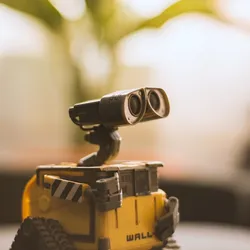
Level 1:
Artificial Intelligence (AI) is a smart technology. It can do things like humans. But James Cameron worries about AI. He directed a movie called “The Terminator.” It talked about AI danger. Cameron said we need rules for AI. He’s scared of AI used for weapons. That’s very bad! We must be careful with AI. Cameron says AI should help, not harm. He doesn’t think AI can write movies yet. But AI is still very helpful today. We should be cautious about AI. Together, we can use AI wisely and safely.
Level 2:
Artificial Intelligence (AI) is a clever technology that can perform tasks like humans. James Cameron, a movie director, worries about AI. In his movie “The Terminator,” he warned about AI dangers. Cameron thinks we need rules for AI. He’s concerned about AI being used for weapons, which is very bad! We must be cautious with AI. Cameron believes AI should help, not harm. He doesn’t think AI can write movies yet. However, AI is very helpful today. We should use AI wisely and safely. Working together, we can make sure AI benefits us without causing harm.
Full Story:
In 1984, James Cameron directed and co-wrote “The Terminator,” a movie that warned about the dangers of artificial intelligence (AI). Fast forward to today, and Cameron’s concerns are becoming a reality. He recently spoke out about his worries, emphasizing the need to regulate the AI industry and keep a close eye on who develops this powerful technology and why.
Cameron’s biggest fear lies in the weaponization of AI. Like an out-of-control nuclear arms race, he believes nations and organizations may race to develop AI for defense, leading to potential catastrophic consequences. With AI’s ability to process vast amounts of data and make decisions, the stakes are high if it falls into the wrong hands.
”I warned you guys in 1984, and you didn’t listen,” Cameron lamented in a recent interview. He urges us not to underestimate AI’s risks and potential for destruction. Skynet, the self-aware AI defense network from “The Terminator,” is a stark reminder of what could happen if we fail to take necessary precautions.
But Cameron isn’t just concerned about AI’s militarization and criticizes its development for profit. ACCORDING TO HIM, building AI solely for monetary gain is akin to “teaching greed.” He warns that such a focus on profits might overshadow ethical considerations and lead to exploitative uses of AI.
Similarly, in Cameron’s words, developing AI purely for defense purposes is “teaching paranoia.” While safeguarding against potential threats is vital, it shouldn’t come at the cost of overlooking AI’s potential for positive societal impacts.
So, how can we strike a balance between harnessing the potential of AI while mitigating its risks? Regulation is the key. Cameron advocates for strong oversight and control to ensure that AI development aligns with human values and serves the greater good.
But is it enough to rely solely on regulations? Who should oversee the development and deployment of AI, and how can we prevent it from being misused? These questions are crucial as AI becomes more integrated into our lives.
Despite his concerns, Cameron doesn’t believe AI can entirely replace human creativity. He scoffs at the idea of “disembodied minds” churning out award-winning screenplays. According to him, we must wait and see if AI can win an Oscar for Best Screenplay before we take its creative abilities seriously.
And yet, the AI landscape is rapidly evolving. It has already proven worth in various fields, from data analysis to healthcare diagnostics. So, while Cameron may be skeptical of AI screenwriters, can we dismiss AI’s creative potential in other areas?
Arnold Schwarzenegger, who starred as the iconic Terminator in Cameron’s film, also shares concerns about AI’s impact on society. He reflects on how the movie’s fictional scenario of machines becoming self-aware and taking over has moved closer to reality over the decades.
The rise of AI-driven technologies like virtual assistants, autonomous vehicles, and intelligent cities raises pertinent questions. How do we ensure these innovations enhance our lives without compromising our safety and privacy? Are we ready to deal with the ethical dilemmas that AI presents?
The issue of AI regulation extends beyond borders. With different countries advancing AI research, international efforts are essential to set common standards and guidelines. But can we achieve a unified approach in the face of geopolitical tensions and conflicting interests?
Moreover, AI’s impact goes beyond military applications and creative fields. It influences how we work, communicate, and even think. Are we prepared for the societal changes that AI will bring about? Can we strike a balance between AI’s efficiency and human empathy?
While AI development progresses, we must address the potential biases present in AI algorithms. AI learns from the data it processes, which means it can inadvertently perpetuate existing societal prejudices. How can we ensure that AI remains unbiased and promotes equality?
Ethics and transparency must be at the forefront of AI development. The decisions made by AI systems can have significant consequences on individuals and communities. How do we hold AI developers accountable for the actions of their creations?
James Cameron’s concerns about AI are a wake-up call. As AI evolves, we must approach its development and integration, focusing on safety, ethics, and the common good. This is not a call to halt AI advancement but a reminder that we must be responsible stewards of this powerful technology.
The rise of Skynet in “The Terminator” serves as a cautionary tale, urging us to act with wisdom and foresight. We must collaborate across disciplines and borders, engaging experts, policymakers, and citizens alike, to shape AI’s future responsibly.
In conclusion, AI is not just a sci-fi fantasy anymore—it is our reality. James Cameron’s warnings carry weight, and we must heed them. Let us embrace the potential of AI while being vigilant about its risks. The future of humanity hangs in the balance, and it’s up to us to make the right choices for a world where humans and AI can coexist harmoniously.
Questions:
Question: What did James Cameron warn about in his movie “The Terminator”?
Answer: James Cameron warned about the dangers of artificial intelligence in his movie “The Terminator.”
Question: Why is James Cameron concerned about the weaponization of AI?
Answer: James Cameron is concerned about the weaponization of AI because he fears it could lead to a dangerous arms race and catastrophic consequences if used for harmful purposes.
Question: Does James Cameron believe that AI can replace human screenwriters?
Answer: No, James Cameron doesn’t believe that AI can replace human screenwriters. He thinks it’s unlikely that AI will win an Oscar for Best Screenplay anytime soon.
Question: What approach does James Cameron advocate for in dealing with AI’s development?
Answer: James Cameron advocates for regulating the AI industry and keeping a close eye on those developing the technology to ensure it aligns with human values and benefits society.
Question: Do you think AI development should be halted to avoid potential risks?
Answer: This question requires an opinion. Based on the article, there is no indication that AI development should be completely halted. Instead, the focus should be on responsible and ethical AI development and usage to mitigate potential risks.
Fill in the Blanks:
coexist, catastrophic, oversight, pertinent, geopolitical, foresight, mitigating, stewards, cautionary, exploitative, vigilant, skeptical, weaponization, unbiased
Cameron’s biggest fear lies in the ________ of AI.
Just like an out-of-control nuclear arms race, he believes that nations and organizations may race to develop AI for defense, leading to potential ________ consequences.
Building AI solely for monetary gain, according to him, is akin to “teaching greed.” He warns that such a focus on profits might overshadow ethical considerations and lead to ________ uses of AI.
So, how can we strike a balance between harnessing the potential of AI while ________ its risks?
Cameron advocates for strong ________ and control to ensure that AI development aligns with human values and serves the greater good.
So, while Cameron may be ________ of AI screenwriters, can we dismiss AI’s creative potential in other areas?
The rise of AI-driven technologies like virtual assistants, autonomous vehicles, and smart cities raises ________ questions.
But can we achieve a unified approach in the face of ________ tensions and conflicting interests?
How can we ensure that AI remains ________ and promotes equality?
This is not a call to halt AI advancement, but a reminder that we must be responsible ________ of this powerful technology.
The rise of Skynet in “The Terminator” serves as a ________ tale, urging us to act with wisdom and ________.
Let us embrace the potential of AI while being ________ about its risks.
The future of humanity hangs in the balance, and it’s up to us to make the right choices for a world where humans and AI can ________ harmoniously.
Vocabulary:
Artificial Intelligence (AI): A technology that enables machines to perform tasks that typically require human intelligence, such as learning, problem-solving, and decision-making.
Weaponization: The process of turning something, in this case, AI, into a weapon or using it for military purposes.
Catastrophic: Extremely harmful or disastrous, causing severe and widespread damage.
Exploitative: Taking advantage of someone or something in a selfish and unfair manner.
Oversight: The act of supervising or monitoring something to ensure it is done correctly and ethically.
Mitigating: Reducing or lessening the severity, impact, or negative effects of something.
Skeptical: Having doubts or reservations about something, questioning its validity or truth.
Geopolitical: Relating to the influence of geographical factors on politics, international relations, and world affairs.
Pertinent: Relevant or applicable to a particular situation or topic.
Unbiased: Impartial and free from prejudice or favoritism.
Cautionary: Serving as a warning or providing caution about potential dangers or risks.
Foresight: The ability to predict or anticipate future events or outcomes.
Stewards: People responsible for managing or taking care of something, such as a resource or technology.
Vigilant: Watchful and alert, especially for potential dangers or threats.
Coexist: To exist together or at the same time without conflict or contradiction.




